November newsletter 2014
Dear Friends,
Yes, it’s December — we missed November’s newsletter, so this is a Dec double dose!
This month, we are honored to share with you our interview with June Millington. For y’all working with teen girls in any capacity, June’s story as an artist, a musician, songwriter, and the organization she founded with her partner, Ann, the Institute for Musical the Arts in Goshen, MA. is something you really want to know about. Their girls Rock and Roll camps are off the charts! I’m sure today there are many teen girls who are just as inspired by June as I was when I was a teen. Check out IMA. They have a fully equip recording studio in their barn! Watch their Ted Talks, videos, and send your girls their way!
 June Millington in 1969, at Fanny Hill, and 2010 at IMA
June Millington in 1969, at Fanny Hill, and 2010 at IMA
June Millington was twenty-one years old in ’69, the year I met her. I was 19. I had taken a job a few months earlier as a secretary at Warner Brothers Records. Fanny, the band she founded with her sister, Jean and Alice deBuhr, was just to become the first all-girl rock band to be signed to make an LP for a major record label, Reprise, a subsidiary of WB and the girls were coming in for a meeting. I was asked to welcome them when they arrived. To say I was gob-smacked when they sauntered into the office, in their jeans and t-shirts, no make-up, long hair down their backs, is mild. I was stunned. Here, they were, girls just like me — but girls who played their own music and were going to be rock stars — not just some guy musician’s old lady, sitting around watching him play… You have to remember, or at least imagine if you are young now — 1969 was not a bonanza year for girl musicians, let alone all girl bands, let alone girls playing rock and roll.
It was just my luck, karma, fate (you name it) that I got to spend a few precious minutes alone with the girls, that day, because it changed the trajectory of my life 180 degrees. We all hit it off immediately, so much so that June invited me to come on over to their house. The band needed a keyboard player and I told them I could play piano. June said, well, let’s try you out. I went by that very night, and moved in a week later.
The band lived in a Spanish style mansion they christened “Fanny Hill” up at the top of Marmont Lane, up from the Chateau Marmont, an infamous hotel at the time, overlooking the Sunset Strip. The house was rented for them by Warner Brothers. The “girls” were given just enough cash to scrounge by doing their own laundry at the coin operated joint down on Sunset, and eating frugally, but they had all the time time they needed to write, rehearse 24/7, jam, and come up with the songs for their first album. Richard hung around some, listening in to practices, and lots of other musicians would drop by, like Lowell (George) from Little Feat, to jam. Over the time I lived at Fanny Hill, there were many who dropped by to see this oddity, girls who could really play! Folks like Bernie Taupin, Tret Fure, Zakir Hussain, Dave Mason, Chris Williamson…
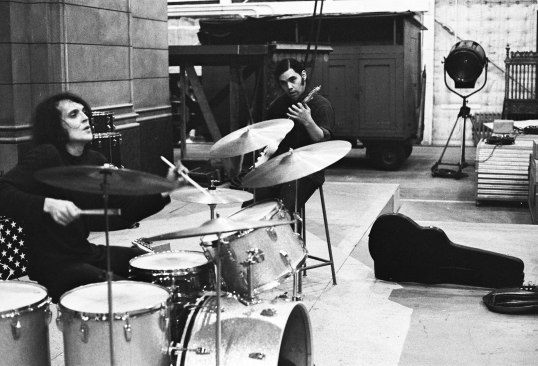 Lowell George and Richie Hayward 1970
Lowell George and Richie Hayward 1970
I couldn’t play piano well enough, but I had experience as a photographer. June has always had a love of photography and had put in a make-shift darkroom behind the rehearsal room, so I took it over her dad’s old Leica M3 and become the documentary member of Fanny Hill.
What I learned during those years has influenced the rest of my life as an artist, and as a woman, and the direction I’ve traveled in my life have their roots deeply planted in what followed. At Fanny Hill, I developed a strength and kind of audacity that gave me the confidence as a young woman to stand up for myself and dare to do things that busted out of the traditional way girls behaved or life choices most girls were headed towards. Witnessing the level of focus, intention, discipline and practice that it took to be musicians taught me more than anything, but it was the trust in me and reflection I got from June, Jean and Alice that nurtured me more than anything. We were young, inspired, creative and stepping out on edges and stages in front of people — I learned I could forget what others thought about me or projected onto me as I took my place on the stage to take photos. I felt I belonged, and was part of a group that was being uplifted — Fanny had financial backing and opportunities that most young bands never get and they were happening and I was on the bus with them!
 Linda Wolf 1970, at Jessi Ed Davis’s house, photo taken by Sandy Konikoff
Linda Wolf 1970, at Jessi Ed Davis’s house, photo taken by Sandy Konikoff
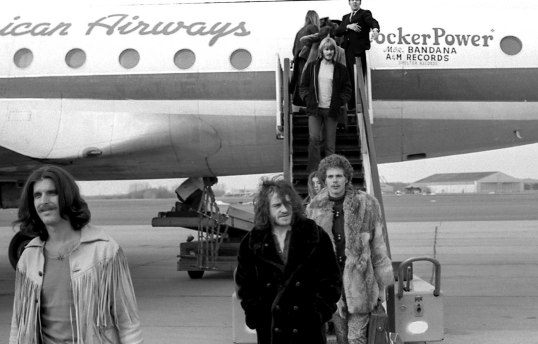 Joe Cocker, Jim Gordon, Kay Poorboy descending the Cocker Power plane 1970
Joe Cocker, Jim Gordon, Kay Poorboy descending the Cocker Power plane 1970
The following year, I left Fanny Hill. I’d joined a thrown together tour as one of the two women photographers — one of 38 crazy people –musicians, 3 kids, their nanny, a pregnant dog named Cannina, plus a crew of roadies, sound men,and a documentary 5-man film crew, and on the road I went with Joe Cocker Mad Dogs and Englishmen. After nearly 2 months, I came back to LA for a spell and lived again at Fanny Hill before leaving for France for five years, to study. That year Fanny took off …
 Sunset Strip, across from the Whiskey, 1970
Sunset Strip, across from the Whiskey, 1970
For the next number of years, the girls toured the world, recorded at the Beatles Apple Studios, and had hit records. They hung out with the Beatles, the Stones, tons of fabulous musicians, and jammed with amazing folks along the way.
As for the girls and me, we have always stayed sisters of the heart and my friendship with Jean, June and Alice deBuhr continues to this day.
And now, our interview with June Millington.
Linda Wolf: How old were you when you first started playing, June?
June Millington: I played piano when I was about five or six. But I was such a tomboy and preferred to play in the trees. M mom just got so mad; she was like “Well all right, fine, don’t play!” We played ukulele pretty early on in the Philippines…But since switching to electric guitar in 1965 that’s been my consuming passion. I just love guitar. It connects me to the world, the universe, and it informs me. It’s my antenna. It’s my antenna and my connection.
L: As a young women in those years, a girl when you started to play out with your sister, plus being Amerasian how did you experience both sexism and racism and the pressures to conform to what women/girls were supposed to be like?
J: I think I was born with passion and an awful lot of will. That burning energy has certainly sustained me. Also, I think it’s a lot of luck, too. But, I have to say that the racism I’ve experienced in my life has trumped everything in terms of what hurt me the most, probably because it came first. Sexism I didn’t even really notice that much when we started to play out as girls. People would go, “Oh wow, you’re really good! Not bad for chicks”—that kind of thing – compliments. So, I think my fire combined with the first racist feedback that we got, that was so hurtful, caused us to go into rock and roll because in rock you can create your own persona, especially at the time because nothing like us had existed before. It became dangerous later on when actually I didn’t need that persona anymore, but it was still there. That’s part of the unpeeling of life. Today, my life, my work with IMA, and writing my autobiography combine to my wanting to be of service. It comes from an integration of the early pain, the ongoing pain, the understanding of pain. In Buddhism, I learned that I am not my thoughts. Playing rock and roll and being part of women’s music and Buddhism has been my way through it all. It’s a very potent intersection, and I’m just lucky that I’m living it.
I’m also lucky is that I stumbled into women’s music, which basically is a melding of music in its purest sense, with spirituality and woman’s energy in it, with a sense of learning, and a sense of politics and empathy and humanity. You have to be a humanitarian to be a feminist. So I began to study that which had happened to women, and it was really shocking.
L: I know you did a YouTube movie that takes the viewer through the years. You honored me to allow me to sing in it! I’m going to stick it here so folks can get a broader picture of your trajectory. Take a minute and check out this video folks. Here’s the URL: http://tinyurl.com/mcoqbun
L. What’s your daily life like now, June?
J: I think basically I’m in service no matter what I’m doing. I am a Buddhist. If I go to a rock conference, I’m just present for what arises. And if I’m teaching at our rock and roll girls’ camps I’m doing the same thing — being present for what arises and staying mindful of my intentions. What else I’ve been doing is writing an autobiography, taping the autobiography. Plus, I’m helping the girls who come through IMA, the younger generation, trying to be a bridge, taking them along with us, the older generation, and of course, I have been doing music for the past 50 years.
L: Tell us about IMA.
J: We have Girls Rock and Roll Camps here at the IMA, which is a nonprofit 501(c)3 for women and girls in music. One of our mantras is, “Changing the world one girl at a time.” We don’t try to think too big at any moment. We teach workshops, record in our studio, and teach girls the business of music. We feel out what is actually needed by each girl in the moment, and we react to that, and try to bring whatever that is into reality.
Girls playing music and working together is not a luxury. We have to have music. Every culture floats and soars and rides on music. The past is taught through music. In many, many cultures that’s how they do it—they sing the story of the past. They sing the coming of being story.
One of the compelling thoughts I pass on to girls who come through IMA is that you do what you can when you can and you have to accept that you can’t do it all at once, and you have to forgive yourself when you fail. When girls walk into camp the first day of class I say, “You’re going to fail. For sure. You cannot learn all this like ordering fries at McDonald’s. You have to be really dedicated. And it’s always a journey. So one minute you’re playing scales, the next minute you’re creating something, thinking oh I didn’t know I could do that! You’re suffering because you’re practicing and then all of a sudden you’re in that creation mode. Discipline is just not quitting. Because it’s hard. It’s really hard.
L. I heard recently, the word discipline comes from the word disciple. When we’re disciplined we are being our own disciple.
J. Yes, and you have to expect you’re going to fail but the whole point is to go for the joy. So you put the two together, discipline and joy, and it’s always interesting what comes up. It’s chaotic, it’s life, it’s incendiary, organic — and it’s what creation is all about. I tell the girls when they’re at camp they have to learn to trust the process and trust themselves, and to forgive themselves, and to be here, really be present. I tell them to try not to text or make calls on their phones, or go to Facebook and all that kind of stuff, but to be here now — in the moment. I think kids need to hear that now. I think they need to know they have an option. They can be very busy, their mind flitting around from one thing to the next, but they can also let all that go, and just be in the moment and see what arises. That’s the essence of meditation.
L: I know when we were young, rock and roll was all about the boys. The screaming for Mick Jagger or the Beatles and before them, Elvis, was like 200 years of pent-up libido, I think… That male sex appeal and the audacity of their strutting around the stage, being rock stars was a major turn on! It was definitely something new to see you, a girl, wailing on the guitar like a guy in those days! What do you tell the girls you work with in camp.
J: Fanny was essentially a funk band. We loved funk and we loved ballads. We loved the girl-group songs of the era—the Supremes, the Marvelettes, the Shirelles. But the frame that we had to mold ourselves into was to play like guys, because that was all society could understand back then-they needed to see girls who could play like guys. If we were going to be successful, we had to step into that frame; so we learned how to do rock and roll. For a long time, and still even now, people just want to identify me as “that chick rock guitar player.” I am a very inquisitive person, and I’m much broader than that. In 1975 I really started to get the Buddhist teachings. I left Hollywood. I prayed for teachers and they came, and the teachings came. And that’s been my journey ever since: Buddhism, women’s music, rock and roll, and now I’m also an educator and a writer.
What I pass along to the girls who come to the camps or anyone who passes within my orbit or periphery is that you have to find that place in you that’s true to who you are. I don’t think girls should try to ape the way guys do it. Guys do it from wherever their center is and girls should do it from their center. The only thing I can tell girls is to find that place in yourself that is true and authentic and go for that. We’re always learning from other people, other genres, other styles, of course, all the time, but you have to find that place inside you that is true to you. I ask girls to think about the question, why you were born into this world, why have you slipped into this dimension? When one gets an answer to that question, it’s not easy because now you have to take responsibility for your own existence. Learning the chords to “Johnny B. Goode” or pointing your guitar like it’s a phallus is easy, but being oneself – that’s another thing altogether! Times have changed.
L. Thank goodness, is all I can say. Here’s to women and girls finding their source of passion and fire and authenticity and making noise — whether that be in math, music or medicine. It’s time for us to find our true voices and let them resonate our bodies and vibrate into the world. You’ve been doing that a long time!
Thank you, June, for what you give so many of us and for being a role model, to me. I’m thankful my path led me to join yours back in 1969. I’ve so much gratitude to be your sister and friend.
 Rehearsal Room at Fanny Hill 1969
Rehearsal Room at Fanny Hill 1969
Folks — Look up the women who are the foremothers of this era of music. Before the Go-Go’s, before The Indigo Girls, before the 390+ and growing list of girl bands on Wikipedia as of today, there was FANNY.
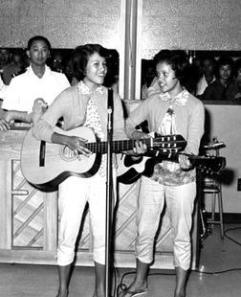

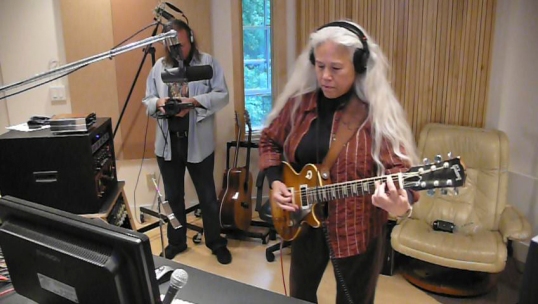
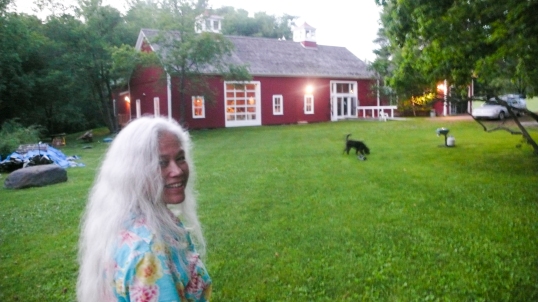
Thanks Linda!
LikeLike
Linda, I love your story, and the interview is wonderful. June, your definition of women’s music is the best I’ve seen, succinctly evocative.
LikeLike
Karlene, thanks so much. I am loving bringing life (through stories and memoirs) to the photos I was fortunate enough to be in the right place at the right time to take. More importantly, June has so much to share as to the hard work, perseverance, and discipline as well as down right fun it takes to be successful in any field!
LikeLike
nicely written and interviewed!
LikeLike
Great stuff. I’ve enjoyed your music for years June and it was interesting to get a background to it all.
As you know, Fanny has a different meaning here in the UK, but Fanny still Rocks for me !!!
LikeLike
Love it!
Great piece, about one of my favorite artists.
Been a fan since we were all that young, and so inspired by what’s happening at IMA.
Thank you for telling the story, Linda.
LikeLike
Thanks AC – me, too!
LikeLike
Awesome interview please play AZ if you tour again. I got into Fanny back in the late 70’s in the 6th grade. I was too young to see you play live! Take care God bless Darren Dawson from Boston via Phoenix
LikeLike